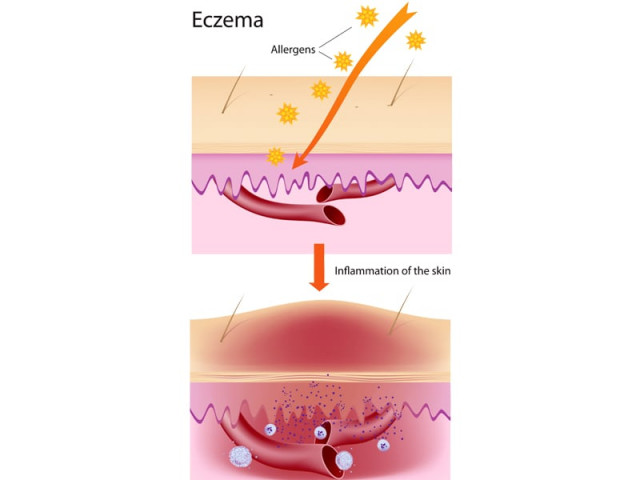Health tips: Ditch the itch
'Atopy' is a skin condition in which the body reacts inappropriately to environmental allergens.

Does your skin, every once in a while, become intensely red and patchy, and make you itch yourself uncontrollably? If yes, then it probably means that you have a skin condition called atopy. Atopy literally means ‘a bad case of allergies’, in which the body reacts inappropriately to environmental allergens. Manifestation of atopy on the skin is called eczema or atopic dermatitis.
Atopic patients have a tendency to develop asthma, hay fever and other allergies which might also be experienced by some of their family members. The condition seems to have roots in genetics and thus can be passed on to successive generations but it’s not contagious as many may believe.
The skin dries out and thus appears parched. Itchy and scaly rashes develop at the elbows, wrists, knees, back and so on. These outbreaks can be traced back to a number of causal factors, including pollen, perfumes, cosmetics, woolen clothing, certain foods, soaps and detergents etc. Given the extensive list of potential causes, it is nearly impossible to completely avoid all of them, especially during winter. However, you can take certain precautions to mitigate the condition.
However, certain lifestyle modifications will definitely improve the condition. Refrain from taking hot showers, use milder, unscented soaps and put on gloves before washing utensils. Refrain from applying perfumes, colognes and aftershaves directly on to the skin. You should also downsize your wardrobe to hold cotton clothing and make sure that the cosmetics you purchase are strictly ‘noncomedogenic’. Moisturise frequently with good old petroleum jelly.
Moreover, alter your diet to reduce dairy products, coffee, soybean products, eggs, nuts, wheat and maize which can potentially trigger allergic reactions. And finally and most importantly, drink more water to keep the skin hydrated.
However, at times the severity of the condition will necessitate measures beyond self-treatment. Visit the dermatologist if your condition worsens. The doctor will ask questions not only about the patient’s conditions but the family as well and will assist in identifying possible changes in the environment which have led to the flare up. The prescription medications will contain mild steroid creams along with specific instructions regarding the method and duration of their use. Certain medications might also be given to modulate the immune system of the body. Neither is prescribed for indefinite periods of time due to their potential side effects. After the severity of the condition subsides, the skin should be maintained via moisturising agents. Depending on the severity of the condition, follow-up visits to the doctor are also recommended. Another therapy reserved for some patients is exposure to ultraviolet light.
Dermatological problems are a cause of psychological and social stigma. But interestingly so, one very important trigger of an eczema outbreak is stress itself. So just fret less to avoid getting stuck in the vicious cycle linking stress and eczema. One might take medications to keep the eczema in check, but if stress levels are high, then medications won’t act as a permanent cure.
Published in The Express Tribune, January 14th, 2012.



















COMMENTS
Comments are moderated and generally will be posted if they are on-topic and not abusive.
For more information, please see our Comments FAQ